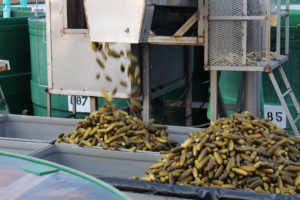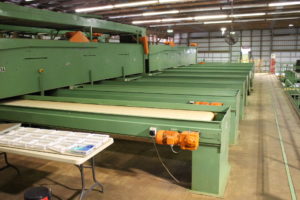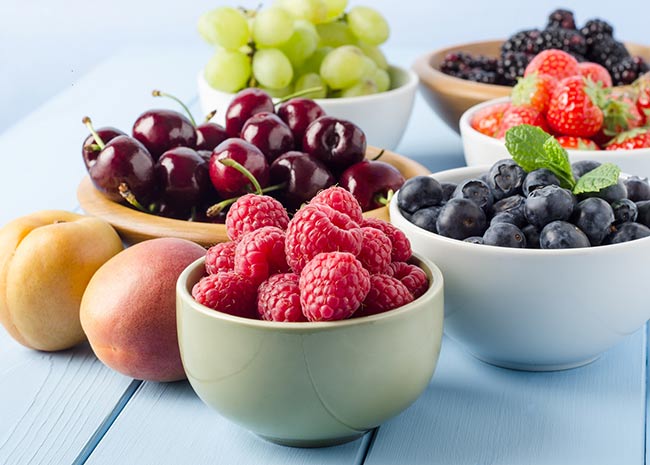Swanson Pickle’s next generation stepping up with improvements
A new crop of Swansons are learning to manage risk and transition at the family’s farm and processing facility in Michigan’s Muskegon County.
The family business is cucumbers, which Swanson Pickle then ferments in 1,374 tanks – each of which hold 905 bushels of the bumpy, green cucurbits.
John Swanson is the company president while his brother, Dave Swanson, works in scheduling, planning when growers may drop off cucumbers for processing. At 83 years of age, grandfather Donald Swanson still can be seen working on the farm on special projects, usually involving equipment.
Today, adult siblings Wes Swanson, Matt Swanson and Katie Hensley help their father, John, manage the farm. Although there’s a good deal of crossover and each wear many hats, Matt handles growing operations and Wes covers the tank yard.
Katie in the last 10 years has ome full circle: She left the family business, earned an MBA at Spain’s IESE business school and worked for Syngenta for four years, first at the company headquarters in Basel, Switzerland, and later with the company’s seed care group in southern Florida. In 2013, she returned to the family business, handling financials and serving on the Michigan Vegetable Council.
 Much has changed at the family business as well during the last decade, she said. “We’ve added more tank space,” she said. “We’ve made a number of efficiency improvements, cut spending.”
Much has changed at the family business as well during the last decade, she said. “We’ve added more tank space,” she said. “We’ve made a number of efficiency improvements, cut spending.”
On a tour of the farm, she points to one of the improvements: angled conveyor belts to help move cucumbers from the grading facility into individual tanks. The self-unloading trucks have turned a job for three people into a task for one.
“I think we’ve really gotten innovative in efficiency projects and streamlining things and mechanizing things where we can,” she said.
The most difficult part of her job, Hensley said, is managing uncertainty.
“I would say with the market the way it is, it’s ultra-competitive, so prices continue to go down,” she said. “We’re basically covering near the cost of production right now, but we’re hoping things are about to turn around.”
In Michigan, cucumbers are grown in rotation with field corn and soybeans. The price of corn is a reference point for pickle buyers.
“We’re kind of competing with the same acreage as corn,” she said. “So, it can be kind of difficult to get people to grow pickles given the alternative. But, you know, right now the price of corn is so low that in a sense that’s just pushing the price of pickles even lower. Buyers know they can get it for that much cheaper.”
Business time
But the Swansons have lots of pickles to sell.
The family operation farms roughly 3,000 acres of cucumbers, corn and soybeans. Yields average between 200 to 230 bushels per acre. About 40 percent of the cucumbers processed at Swansons are grown on family land – the rest are grown on farms across mid-Michigan, a way of the company managing environmental risk.
“Since we source from wide enough range in Michigan, we can cover our risk as well,” Hensley said. “There’s so many microclimates in Michigan, that you can manage the risk within a county, too.”
The Swansons harvest mechanically and in the last decade have begun offering custom harvesting as a way of attracting new growers and retaining other new growers. By not investing in expensive harvest equipment of their own, would-be cucumber growers can keep their crop options open.
“If the price of onions goes way up and they want to get into that, then they can be more flexible, or opportunistic,” Hensley said.
The family operation can grade more than 1 million bushels a year. Many are sold to Kraft Heinz, which has a facility in Holland, Michigan south of Ravenna, Hensley said. Many others are also sold to Bay Valley Foods, which is owned by Treehouse Foods.
John Swanson said he would like to see the next generation take full control. Hensley and her brothers would be the fourth generation of the family to take leadership of the operation, started as a cucumber-buying and processing operation in the 1950s, by great-grandfather Wesley Swanson. Grandfather Donald Swanson diversified the company in 1980, moving into farming.
 “We’ve seen a number of transitions in that sense, happen,” Hensley said. But she said that individually, the siblings are new to the transition process.
“We’ve seen a number of transitions in that sense, happen,” Hensley said. But she said that individually, the siblings are new to the transition process.
The family has started to carve out half an hour each week for an informal meeting to foster communication. Wes Swanson said he’d like to continue to find ways to improve every year, whether through new efficiencies or elsewhere in the company.
“I hope everyone is still getting along and that we are successful,” said Matt Swanson.
Creative labor approach
Labor is a difficult issue throughout the agriculture industry, where the H-2A visa program is often the last resort.
“You only use it if you have to,” Hensley said.
So far, the company has held off using seasonal labor through the H-2A visa program. The company has about 20 full- time employees but will employ as many as 70 during the peak of the season to grade and sort cucumbers. Later in the season, some temporary workers are also needed in the tank yard.
 “It’s difficult with an 11-week season. We have a very short season,” Hensley said. “We don’t have any housing.” The company has about 20 full-time employees but will employ as many as 70 during the peak of the season in the grading and sorting facility.
“It’s difficult with an 11-week season. We have a very short season,” Hensley said. “We don’t have any housing.” The company has about 20 full-time employees but will employ as many as 70 during the peak of the season in the grading and sorting facility.
In order to meet the need, the Swansons have had to get creative. Last year, the company worked with a local apple producer to put his H-2A people to work until apples ripened. And during the seasonal rush, almost all local applicants are welcome.
“We basically will give most people a shot,” she said. “It’s common for some families have several members working there during the season.
The Swansons are planning ahead so that there are many good seasons of work ahead – for their own family, and for the families of their workers.
“We have a lot of people that do return every year,” Hensley said.
— Stephen Kloosterman, contributing editor










